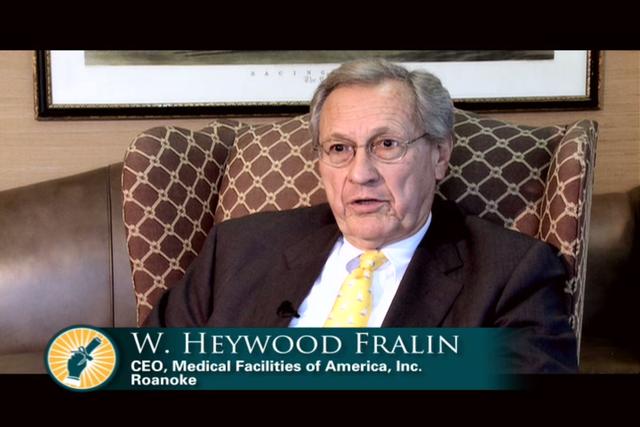
A group of major business and political leaders toured the state recently, touting a new economic study that shows the General Assembly’s investment in higher education has indeed paid off handsomely. The “Grow By Degrees” program, a campaign of the Virginia Higher Education Council, was formed in 2009 when there was concern about the Commonwealth’s dwindling commitment to funding higher education.
VBHEC Chairman Heywood Fralin, also the chairman of Roanoke-based Medical Facilities of America, was joined at the Virginia Tech Carilion Research Institute campus by Carilion Clinic CEP Nancy Agee, Virginia Tech President Charles Steger, Virginia Western Community College President Bobby Sandel and others, beating the drum for increased state spending for education.
Fralin and company broke out the charts and a video for proof: every dollar the state invests in public higher education results in $17.40 of economic activity and $1.29 in new state tax revenues. Virginia’s annual investment in public higher education generates more than $28 billion in economic activity, accounts for 131,200 jobs and a return of $2.1 billion in tax revenues. “[Its] data that will show a uniquely powerful economic engine,” said Fralin, widely praised by other speakers for his work in getting Grow By Degrees off the ground.
The positive data supports the reason why Grow by Degrees was launched in 2009, after a decade or so of decreased funding in the General Assembly for public higher education.
Both gubernatorial candidates support Grow By Degrees; in a release Terry McAuliffe lauded its effort “to build sustained support for reform and investment in Virginia’s community colleges and universities,” while current Attorney General Ken Cuccinelli called “the link between higher education and Virginia’s economy…direct and powerful.”
The Grow By Degrees contingent, which held news conferences in Norfolk and Richmond as well as in Roanoke, on the same day, said one result of their advocacy was passage of the Top Jobs Act in 2011. That state legislation pumped more than $400 million back into higher education programs, leading to 14,000 additional undergraduates enrolled (since 2009) and an increase in the percentage of working age Virginians with an associates degree or higher (from 42 to 45 percent). The state has pledged to add 100,000 new degrees to the labor pool by 2025; many will be of the two-year variety.
Nancy Agee, a board member for the VBHEC, said, “A better prepared workforce helps the economy, [and] higher education drives our Virginia economy. Any money allocated by the General Assembly said Agee, “has a huge, positive and expanding multiplier effect [on the economy].”
House of Delegates Majority Leader Kirk Cox, a long time public school teacher himself, said the General Assembly responded to demands from the VBHEC and Grow By Degrees, helping to fund “degrees that are in high demand.” The Top Jobs Act added Cox, addressed the “middle class squeeze” in regards to funding higher education. He also noted that the last two years have seen the smallest college tuition increases of the past decade.
“Virginia must make a clear and firm commitment of support,” said Sandel, who believes two thirds of the 100,000 new degrees that the state is aiming for by 2025 will come from two-year programs. Many of those degrees will go to working adults returning to school for further training. “Our message was simple,” said Fralin, “we called for a unified, bipartisan program…to reform our system of higher education.”
Based on the level of commitment and results already achieved, the new goals are likely to be met.
By Gene Marrano
